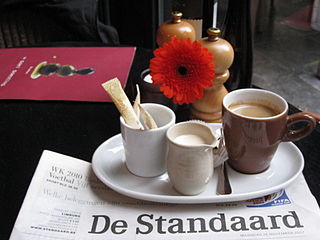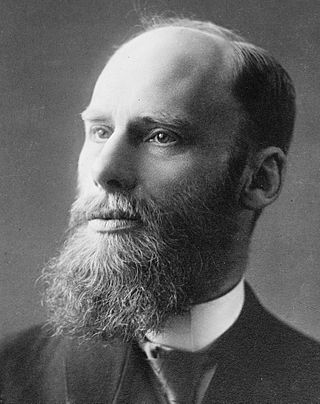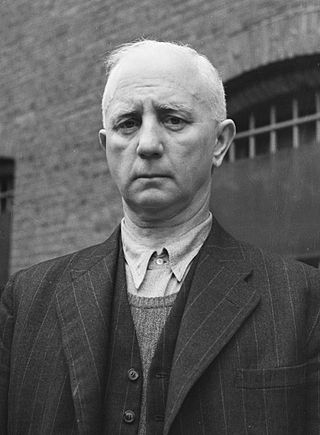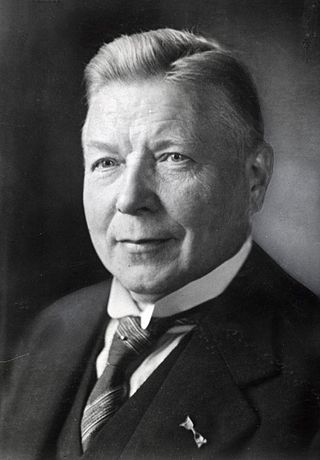Related Research Articles

The Anti-Revolutionary Party was a Protestant conservative and Christian democratic political party in the Netherlands. The party was founded in 1879 by Abraham Kuyper, a neo-Calvinist theologian and minister. In 1980 the party merged with the Catholic People's Party (KVP) and the Christian Historical Union (CHU) to form the Christian Democratic Appeal (CDA).

JonkheerDirk Jan de Geer was a Dutch politician Christian Historical Union who served as Prime Minister of the Netherlands from 8 March 1926 until 10 August 1929 and from 10 August 1939 until 3 September 1940.

De Standaard is a quality Flemish daily newspaper published in Belgium by Mediahuis. It was traditionally a Christian-Democratic paper, associated with the Christian-Democratic and Flemish Party, and in opposition to the Socialist Flemish daily De Morgen. In recent years De Standaard has renounced its original ideological ties.

Hendrikus "Hendrik" Colijn was a Dutch politician of the Anti-Revolutionary Party. He served as Prime Minister of the Netherlands from 4 August 1925 until 8 March 1926, and from 26 May 1933 until 10 August 1939.

Willy Vandersteen was a Belgian creator of comic books. In a career spanning 50 years, he created a large studio and published more than 1,000 comic albums in over 25 series, selling more than 200 million copies worldwide.

The minister of foreign affairs is the head of the Ministry of Foreign Affairs and a member of the Cabinet and the Council of Ministers. The incumbent minister is Hanke Bruins Slot of the Christian Democratic Appeal (CDA) who has been in office since 5 September 2023. Regularly, a state secretary is assigned to the ministry who is tasked with specific portfolios, currently the function is not in use. Additionally since 1965 there has been a minister without portfolio assigned to the ministry, the minister for foreign trade and development cooperation has traditionally development cooperation as portfolio, since 2012 the portfolio of trade and export has been assigned added to the function. The current minister for foreign trade and development cooperation is Liesje Schreinemacher of the People's Party for Freedom and Democracy (VVD) who has been in office since 1 September 2023.

Het Nieuwsblad is a Flemish newspaper that mainly focusses on "a broad view" regarding politics, culture, economics, lifestyle, society and sports.

Josephus Robertus Hendricus "Josef" van Schaik was a Dutch politician of the defunct Roman Catholic State Party (RKSP) and later co-founder of the Catholic People's Party (KVP) now merged into the Christian Democratic Appeal (CDA) party and jurist. He was granted the honorary title of Minister of State on 15 March 1951.

Jan Rudolph Slotemaker de Bruïne was a Dutch politician of the defunct Christian Historical Union (CHU) party now merged into the Christian Democratic Appeal (CDA) party and theologian.

Marius Hugh Louis Wilhelm Blokzijl or Max Blokzijl was a Dutch singer and journalist. After the German occupation of the Netherlands Blokzijl was sentenced to death and executed for his collaboration with Nazi Germany.

Charles Joseph Ignace Marie Welter was a Dutch politician and diplomat of the General League of Roman Catholic Caucuses, later the Roman Catholic State Party (RKSP), the Catholic People's Party (KVP) and founder of Catholic National Party (KNP) before rejoining the Catholic People's Party and nonprofit director.

Jacob Adriaan de Wilde was a Dutch politician of the defunct Anti-Revolutionary Party (ARP) now merged into the Christian Democratic Appeal (CDA) party and jurist.

The Fifth Colijn cabinet was the cabinet of the Netherlands from 25 July 1939 until 10 August 1939. The cabinet was formed by the political parties Anti-Revolutionary Party (ARP), Christian Historical Union (CHU) and the Liberal State Party (LSP) following the fall of the Fourth Colijn cabinet on 29 June 1939. The right-wing cabinet was a minority government in the House of Representatives. It was the last of five cabinets of Hendrikus Colijn, the Leader of the Anti-Revolutionary Party as Prime Minister. The cabinet was dismissed by Queen Wilhelmina on 27 July 1939, just two days after it took office.

The Fourth Colijn cabinet was the cabinet of the Netherlands from 24 June 1937 until 25 July 1939. The cabinet was formed by the political parties Roman Catholic State Party (RKSP), Anti-Revolutionary Party (ARP) and the Christian Historical Union (CHU) after the election of 1937. The right-wing cabinet was a majority government in the House of Representatives. It was the fourth of five cabinets of Hendrikus Colijn, the Leader of the Anti-Revolutionary Party as Prime Minister.

The Third Colijn cabinet was the cabinet of the Netherlands from 31 July 1935 until 24 June 1937. The cabinet was formed by the political parties Roman Catholic State Party (RKSP), Anti-Revolutionary Party (ARP), Christian Historical Union (CHU), Liberal State Party (LSP) and the Free-thinking Democratic League (VDB) after the resignation of the Second Colijn cabinet on 23 July 1935. The centre-right cabinet was a majority government in the House of Representatives and was a continuation of the previous Cabinet Colijn II. It was the third of five cabinets of Hendrikus Colijn, the Leader of the Anti-Revolutionary Party as Prime Minister.

The Second Colijn cabinet was the cabinet of the Netherlands from 26 May 1933 until 31 July 1935. The cabinet was formed by the political parties Roman Catholic State Party (RKSP), Anti-Revolutionary Party (ARP), Christian Historical Union (CHU), Liberal State Party (LSP) and the Free-thinking Democratic League (VDB) after the election of 1933. The centre-right cabinet was a majority government in the House of Representatives. It was the second of five cabinets of Hendrikus Colijn, the Leader of the Anti-Revolutionary Party as Prime Minister.

The First Colijn cabinet was the cabinet of the Netherlands from 4 August 1925 until 8 March 1926. The cabinet was formed by the political parties Roman Catholic State Party (RKSP), Anti-Revolutionary Party (ARP) and the Christian Historical Union (CHU) after the election of 1925. The centre-right cabinet was a majority government in the House of Representatives. It was the first of five cabinets of Hendrikus Colijn, the Leader of the Anti-Revolutionary Party as Prime Minister.

Carl Paul Maria Romme was a Dutch politician of the Roman Catholic State Party (RKSP) and later co-founder of the Catholic People's Party (KVP) and jurist. He was granted the honorary title of Minister of State on 16 December 1971.

Laurentius Nicolaas Deckers was a Dutch politician and diplomat of the defunct Roman Catholic State Party (RKSP) and later co-founder of the Catholic People's Party (KVP) now merged into the Christian Democratic Appeal (CDA) party and agronomist.
References
- ↑ "Dr. H. Colijn". Parlement.com (in Dutch). Retrieved 1 December 2023.
- ↑ "De Standaard" (in Dutch). Network of War Collections . Retrieved 1 December 2023.